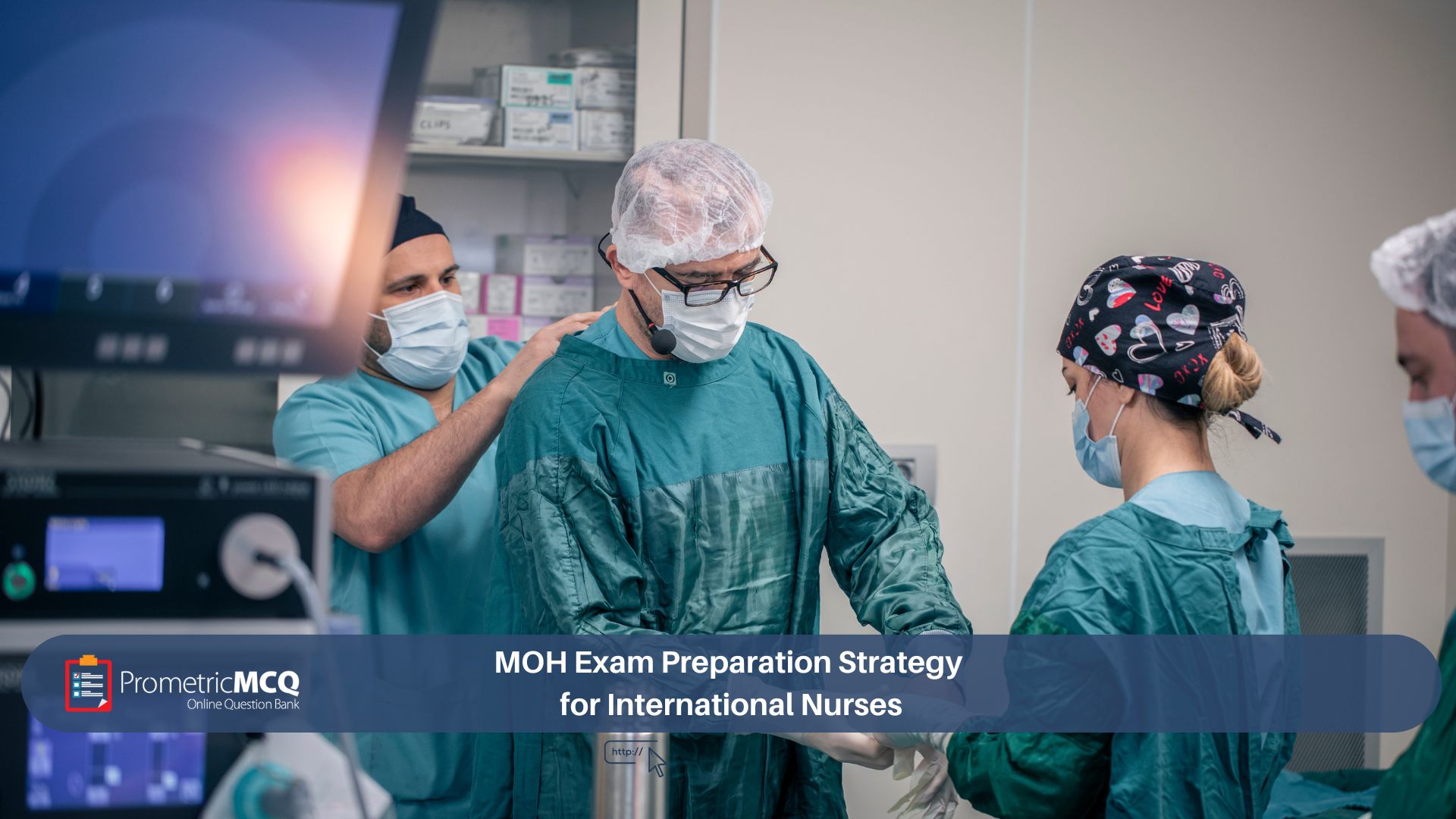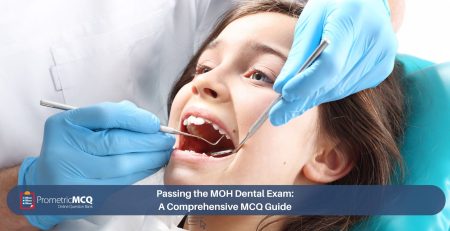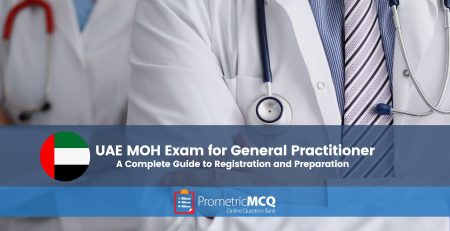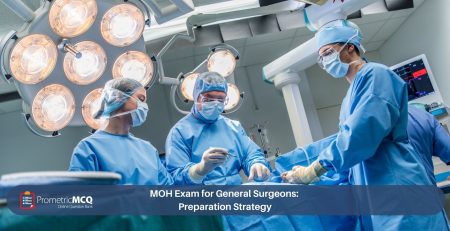
MOH Exam Preparation Strategy for International Nurses
fatima@prometricmcq.com2025-09-17T14:38:11+00:00Table of Contents
ToggleMOH Exam Preparation Strategy for International Nurses (2025)
For thousands of skilled and dedicated nurses around the world, the United Arab Emirates represents a pinnacle of career advancement. The prospect of working in the modern healthcare facilities of the Northern Emirates—Sharjah, Ajman, and others—is a powerful motivator. However, this ambition comes with a significant challenge: the Ministry of Health and Prevention (MOHAP) Prometric exam. For international nurses, this exam is more than just a test of knowledge; it is a bridge between their home country’s nursing practices and the high, international standards of the UAE.
The journey can feel daunting. You are not just learning clinical content; you are adapting to a new exam format, a different regulatory environment, and a testing style that heavily emphasizes critical thinking over rote memorization. Success does not come from simply studying harder; it comes from studying smarter. A well-defined, phased preparation strategy is the single most important factor that separates successful candidates from those who have to re-test.
This ultimate guide is designed specifically for you—the international nurse. We will provide a comprehensive, step-by-step strategy to demystify the MOH exam and guide you from the initial planning stages to exam-day success. We will break down the preparation into manageable phases, address the unique challenges you face, and provide the expert tips and resources you need. This is your blueprint for passing the MOH exam on the first attempt and launching your dream career in the UAE.
Key Takeaways for a Winning MOH Exam Strategy
- Adopt a Phased Approach: Don’t just cram. Divide your preparation into three distinct phases: Foundational Content Review, Intensive MCQ Practice, and Final Simulation.
- MCQs are Your Primary Tool: Success hinges on your ability to deconstruct case-based questions. Make a high-quality question bank (QBank) the cornerstone of your study.
- Bridge the Practice Gap: Your clinical experience is valuable, but the exam tests international, evidence-based best practices. Prioritize official guidelines over personal or regional protocols.
- Prioritization is a Core Skill: The exam will constantly test your ability to identify the sickest patient. Master frameworks like ABCs and Maslow’s Hierarchy of Needs.
- Create a Detailed Study Plan: A structured, written study plan is essential for covering the vast syllabus without becoming overwhelmed.
Understanding the Challenge: The International Nurse’s Perspective
Before diving into the strategy, it’s crucial to acknowledge the specific hurdles international nurses face:
- Variations in Clinical Practice: Nursing protocols, common medications, and even the scope of practice can differ significantly from your home country.
- Unfamiliarity with Computer-Based Testing (CBT): The Prometric format, with its timed, high-stakes environment, can be stressful if you’re not used to it.
- Emphasis on Critical Thinking: Many nursing education systems focus on memorization. The MOH exam, however, is built on clinical vignettes that require you to analyze a situation and make a judgment call.
- Language and Terminology: While the exam is in English, subtle differences in medical terminology or phrasing can pose a challenge.
Our comprehensive MOH Prometric exam preparation guide is designed to help you navigate these exact challenges.
The 3-Phase Blueprint to MOH Exam Success
A successful preparation journey spans approximately 3-4 months. We recommend dividing this time into three strategic phases.
Phase 1: The Foundational Phase (Weeks 1-6)
Goal: To build a comprehensive and solid understanding of all core nursing subjects covered in the MOH exam syllabus.
Step 1: Deconstruct the MOH Exam Blueprint
You cannot hit a target you can’t see. Your first step is to thoroughly understand the UAE MOH exam syllabus. The exam is a comprehensive test of a registered nurse’s abilities. Key domains include:
- Fundamentals of Nursing
- Medical-Surgical Nursing (the largest component)
- Pharmacology
- Maternal & Child Health (Obstetrics & Pediatrics)
- Patient Safety & Infection Control
- Leadership, Management, and Ethics
Step 2: Gather Your Core Study Resources
Your primary resource should be an NCLEX-RN review book (e.g., Saunders, Kaplan). The NCLEX and MOH exams share a similar focus on critical thinking and patient safety, making these books an excellent foundation. Supplement this with:
- A good nursing drug guide.
- A lab value interpretation handbook.
- Access to a high-quality, MOH-focused MCQ question bank.
Step 3: Create and Commit to a Study Schedule
During this phase, focus on one subject area per week. For example:
- Week 1: Fundamentals & Infection Control
- Week 2: Cardiology & Hematology
- Week 3: Respiratory & Endocrine
- Week 4: Neurology & GI/Renal
- Week 5: Obstetrics & Pediatrics
- Week 6: Pharmacology Review & Leadership
Dedicate 3-4 hours per day. Spend the first half of each session reviewing content from your textbook and the second half answering 50-75 practice questions on that topic in “tutor mode” to understand the rationales.
Phase 2: The Intensive MCQ Phase (Weeks 7-12)
Goal: To transition from passive learning to active problem-solving and master the art of answering MOH-style questions.
Step 1: Make the QBank Your Primary Tool
This is where the real learning happens. Your daily routine should now shift. Instead of starting with a book, start with practice questions. Aim to complete 75-100 mixed MCQs daily. A comprehensive QBank like the one found in our MCQs packages is essential for this phase.
Step 2: Practice in Timed Mode
Begin doing your question blocks under timed conditions. The exam gives you 165 minutes for 150 questions, which is about 66 seconds per question. Learning to manage your time and avoid getting stuck on difficult questions is a skill that must be practiced.
Step 3: Maintain a Detailed Error Log
This is a game-changer. For every question you get wrong (and even those you guessed right), write down:
- The core topic of the question.
- Why you chose the wrong answer (e.g., “I misunderstood the question,” “I didn’t know the side effect of this drug”).
- A concise summary of the correct rationale.
Reviewing this log weekly is the single most effective way to turn weaknesses into strengths.
Phase 3: The Simulation & Refinement Phase (Weeks 13-14)
Goal: To build exam stamina, consolidate knowledge, and peak at the right time.
Step 1: Take Full-Length Mock Exams
In the final two weeks, take at least two full-length, 150-question mock exams under strict, uninterrupted exam conditions. This will prepare you mentally and physically for the marathon of the actual test.
Step 2: Focus on High-Yield Memorization
This is the time to drill the things that require pure memorization: common lab values, therapeutic drug levels, isolation precaution types, and critical pharmacology facts. Use flashcards for this.
Step 3: The Final Week – Taper and Review
Do not learn any new material in the last 5-7 days. Your focus should be on:
- Lightly reviewing your error log and flashcards.
- Practicing dosage calculation questions until they are effortless.
- Getting 7-8 hours of sleep per night.
- The day before the exam, STOP studying. Relax, eat a good meal, and get your documents ready. Your brain needs to rest to perform at its peak.
Frequently Asked Questions (FAQs) for International Nurses
Your hands-on experience is incredibly valuable for context, but it is not enough on its own. The MOH exam specifically tests your knowledge of international, evidence-based standards of care. You must be prepared to answer questions based on textbook best practices, even if they differ from what you did in your previous hospital.
They are very similar in style and philosophy. Both are computer-based, focus on patient safety, and use critical thinking questions (especially prioritization). This is why NCLEX review materials are the recommended starting point for MOH preparation. The main difference is that the MOH exam does not use the adaptive testing format of the NCLEX.
The most common reasons include insufficient MCQ practice, poor time management, a lack of focus on patient safety and prioritization questions, and relying too heavily on outdated or region-specific clinical practices instead of international guidelines.
The exam does not test religious law. However, it does test professional ethics and cultural sensitivity, which are universal nursing principles. You should be familiar with concepts like patient autonomy, informed consent, and confidentiality, which are globally recognized. The International Council of Nurses (ICN) Code of Ethics is an excellent resource for these principles.
The process begins with creating an account on the MOHAP portal, submitting your educational and professional documents, and then applying for the exam once your profile is approved. For a detailed walkthrough, refer to our guide on the application process for a MOH medical license.
The exam is graded as Pass/Fail. While MOHAP does not publish an official passing percentage, the generally accepted standard is around 60%. To be safe, your goal during preparation should be to consistently score above 70% on practice exams.
Passing the exam gives you an eligibility letter. The next critical step is the Primary Source Verification (PSV) of your documents by the DataFlow Group. Once you have a positive DataFlow report and a job offer, your employer will proceed with activating your UAE MOH license.
It is highly recommended to pass the MOH exam from your home country. Most employers in the UAE will not consider an international applicant for a nursing position without a valid eligibility letter from the MOHAP. Passing the exam first makes you a much more attractive candidate.
Patient Safety. This is not a single topic but an overarching theme that covers infection control, medication administration rights, fall prevention, and identifying life-threatening emergencies. Nearly every clinical scenario will have a safety component. If you always ask yourself, “Which option keeps the patient safest right now?” you will be on the right track.
The most effective preparation comes from using a question bank specifically designed to mirror the style and content of the exam. A high-quality QBank will provide hundreds of case-based questions with detailed rationales. You can find a comprehensive resource at MOH Nursing Exam MCQs.
Conclusion: Your Journey to Becoming a UAE Nurse
The path for an international nurse to pass the MOHAP exam is a marathon, not a sprint. It requires dedication, resilience, and above all, a smart and strategic plan. By embracing the 3-phase blueprint, committing to active learning through MCQs, and focusing on the principles of safe, evidence-based care, you can overcome the unique challenges you face. This journey will not only prepare you to pass a test; it will prepare you to be an excellent and confident nurse in the UAE’s advanced healthcare system. Your dream career is within reach—all it takes is the right strategy.
Ready to Implement Your Winning Strategy?
Our premium MOH Nursing QBank is built for international nurses. It features thousands of high-yield, case-based questions, detailed rationales, and simulated exams to transform your preparation into a passing score.










